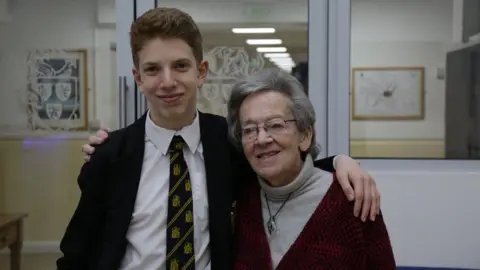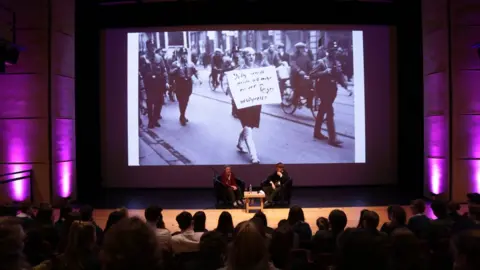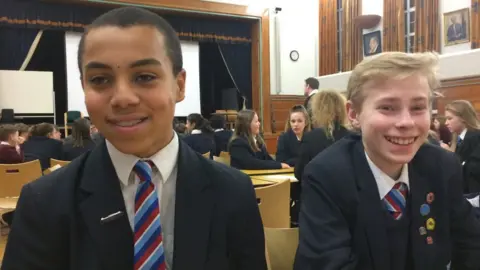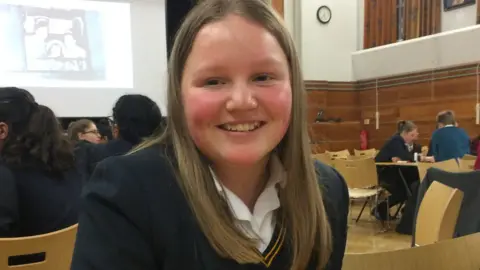'In spite of Hitler, I'm here to talk at my grandson's school'
 HAMPTON SCHOOL
HAMPTON SCHOOL"It's so miraculous that I'm here and I've got him," says Bea Green, 92.
"I'm kind of touched. Yes, it's quite emotional - not only that I survived and that I had three lovely sons, but also that I have grandchildren.
"In spite of Hitler, we're here - three generations - it's a sort of miracle."
Mrs Green, who describes herself as a Bavarian Jewish Brit, was the same age as her grandson Ben is now, 14, when she left Germany in 1939 on a train full of children bound for England.
Now, she is sharing her story with pupils at Ben's school, Hampton School in Middlesex, and from other schools in the local area.
Strong language
Mrs Green tells a packed hall of some 200 teenagers she was eight years old when Hitler came to power in 1933.
And she is unafraid to use strong language as she gives them her judgement of the German chancellor's character.
"I like to call him - maybe I shouldn't say this to you, but I call him 'the shitty bastard'," she says, with a twinkle in her eye as the young people giggle.
"If you can think of something ruder, then let me know."
She recalls how the "brown shirts", Nazi paramilitaries, beat up her lawyer father when he went to defend a client who had been arrested.
They cut his trousers, put a plaque around his neck saying: "I am a Jew and I will never again complain to the police," and then paraded him around the streets of Munich barefoot.
A picture of her father, Dr Michael Siegel, has since become a symbol of the anti-Semitic persecution in Germany at that time.
 HAMPTON SCHOOL
HAMPTON SCHOOLShe tells the pupils how she was off school that day with a bad cold and remembers seeing his coat covered with bloodstains and how he covered his face so that she couldn't see how beaten he was.
She also remembers the events of Kristallnacht or Night of Broken Glass in November 1938, when Nazis in Germany set light to synagogues and vandalised Jewish homes, schools and businesses.
Jewish men were rounded up sent to Nazi concentration camps, but fortunately for Mrs Green's family, her father was able to make a trip to Luxembourg for a couple of days and avoided being arrested.
Mrs Green recalls how the Nazis came three times to the family home looking for the men of the household.
"My life changed from that point onwards, as you can imagine," she tells the teenagers.
The following year, aged 14, she was taken to the station and put on a what was called Kindertransport - a train that would take Jewish children out of Germany.
"This train left at midnight. Do you know why? The Munich authorities didn't want the public asking questions.
"You see it's very easy to blame all Germans of that period - well, they weren't all Nazis and not all knew what was going on."
One of the pupils asks how she felt once she had boarded that train.
"Up till that moment the whole thing was exciting... but then I saw my mum step behind my dad with a handkerchief - she hoped I wouldn't see her cry.
"That hit me and made me feel sad for her - and then for myself."
Firsthand history
For Jack, 13, from Turing House School in Richmond, Mrs Green's firsthand story makes the historical event come alive.
"I thought it put a very human touch on the Holocaust and other genocides. I think so often tragedies like that are just numbers or pictures which don't always convey how awful the events truly were.

"It won't be for much longer that we get to hear these stories firsthand."
Mrs Green agrees that the personal stories are key for remembering what happened.
"One has to remind people of unpleasant things and in my case it's the miracle of surviving, when so many Jews were killed by Hitler.
"If you can get, if you like, the eyewitness report then someone like me aged 92 is still quite useful.
"If you are there in person and can give evidence as if in a court, then it's more effective than opening a book at page 10 to tell the same story."
George, 13, also from Turing House School, says he won't forget Mrs Green's story.
"I'm really glad I came. What she was saying was really moving - I'll remember it forever I think."
Grace, 13, a pupils at Tolworth Girls' School in Surbiton, Surrey, says: "Mrs Green tells these stories, but it's not a story, it actually happened.

"It just shows that we don't want any of this to happen again and we shouldn't discriminate against people that are different to us."
Classmate Gemma, 13, says: "Everyone deserves rights and they shouldn't be judged on their religion and stuff that sets them apart from others, like what they have to wear."
For Mrs Green's grandson, Ben, introducing his grandmother on stage was a privilege he won't forget.
"I'm really proud to have a grandmother who's so outspoken," says Ben.
"What my grandma is talking about just shows this could happen to anyone and it should never happen again.
"Germany was a civilised society - to think it can't happen in a civilised society in this day and age is foolish."
The story ends happily enough in that Mrs Green survived, as did her older brother, and her parents fled Germany after managing to get visas for Peru.
Mrs Green was reunited with them in Peru years later before she returned to England and settled in south London with her husband and three sons.
At the end of her talk, one pupil asks her if she had ever thought about moving back to Germany.
"No. Yes and no. I'm at home in London. I describe myself as a Bavarian Jewish Brit - which tells you everything.
"But now I'm at home here. I'm happy here and," turning to Ben, "I have lovely grandchildren."
